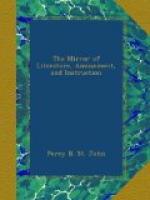The Greeks were not such grave people as some may be inclined to think them. Among them, poetry and music were so intimately connected, that they were in fact one and the same. It is not so with us; we have Byron and Moore, in poetry; but where are their parallels in English music!
“Music,” says Plutarch, “was the universal language of Greece, the sacred vehicle of history, philosophy, laws, and morals;” but in England it is little more than a mere amusement to while away the evening, or at best, but a branch of female education. Pianos are become articles of furniture to be met with in almost every other genteel house; Miss and her sisters sit down by turns, and screw themselves up to Ah vous dirai, or “I’d be a butterfly”—till some handsome young fellow who has stood behind her chair for six months, turned over her music, or accompanied her through a few liquorish airs, vows his tender passion, brings her the last new song, and at length swears to be her accompaniment throughout life. The piano is then locked up, the music sent to Bath or Canterbury, and the lady is married and cannot sing.
But the Greek poets sang their own verses: “Homer literally sang the wrath of Achilles, and the woes of Greece;” would it were so in England. Then, my poetical public, we should have Anacreon Moore singing his “Rich and rare were the gems she wore,” in some such place as the Quadrant, or Opera Colonnade; and Sir Walter Scott celebrating the Field of Waterloo, not in the broad-margined octavos of Paternoster-row, but about the purlieus of the Horse Guards. Wordsworth would be his own Skylark. The laureate, Southey, would perch himself on the dome of the New Palace. Campbell would step out of New Burlingtonstreet into the Park; Miss Mitford would keep a Covent-Garden audience awake with her own tragedies, and Planche would no longer entrust his rhymes to Paton or Vestris. On the other hand, Braham would no longer be indebted to Moore for his songs, Bishop would write, compose, and sing his own operas, and all our vocalists enter, like Dryden’s king and two fiddlers, solus!
Could we but once become a musical people, we should no longer marvel at the effect of music in ancient times; for who knows but that if an Englishman were to play like Orpheus, the River Thames might cease to flow; the disposal of Mr. Cross’s menagerie be no longer a question, since the animals might be allowed to ramble about the Strand; and Snowdon or Cader Idris journey to the King’s Theatre to listen to his inspirations.
It is, however, impossible to calculate the benefits which this acquisition of musical skill might prove to the English people. What bloodshed and tribulation it would prevent. Weare, or Maria Marten, like Stradella, might have disarmed their assassins; the Insolvent Act would be obsolete, and duns defeated; since hundreds of improvident wights, like Palma, might, by their strains, soften the hearts of their




